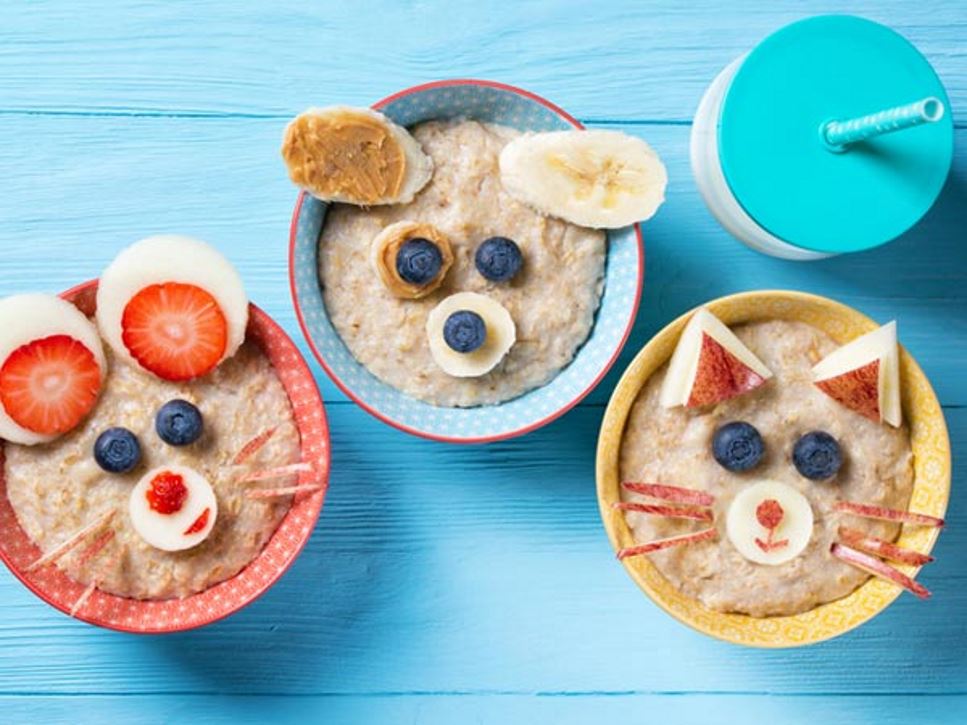Breakfast is an important meal for growing children. Studies show that breakfast eaters tend to have higher school attendance, less tardiness and fewer hunger-induced stomach aches in the morning. Their overall test scores are higher, they concentrate better, solve problems more easily and have better muscle coordination. Children who eat breakfast also are more likely to maintain a healthy weight and get enough calcium, too. Whether your children eat at home or at school, be sure they eat a nutritious breakfast every day.
Whip Up a Quick and Easy Morning Meal
Start your child's day in a healthful direction with a balanced breakfast that incorporates a variety of nutrient-dense foods. Try some of these quick and easy options:
- Peanut butter spread on whole-grain toast
- Grits and eggs
- Porridge with ginger and cinnamon
- Oyster omelet or omurice (fried rice omelet)
- Chilaquiles with eggs
- Iron-fortified cereal with milk or fortified non-dairy alternative and banana slices
- Instant oatmeal topped with chopped walnuts and sliced strawberries
- Dosa (lentil and rice crepe) plain or stuffed with curried potatoes and chutney
- Smoothie including milk or fortified non-dairy alternative, spinach, frozen banana and nut butter
- Parfait with layers of yogurt, whole-grain granola and blueberries
- Ful mudammas — fava bean salad with parsley, tomatoes, green onion, lemon juice and extra-virgin olive oil
Make a Breakfast Bar
Let your kids build their own breakfast with a breakfast bar. Similar to a salad bar, a breakfast bar includes a variety of foods to mix and match. Little ones love to create unusual combinations by mixing, stacking and organizing ingredients. Will peanut butter glue the berries to a waffle? Or will yogurt smother nuts and fruit? No matter what nutritious combinations they create, they will love the sense of control a breakfast bar offers. Here are some ideas:
- Whole-grain cereals, waffles, tortillas, bread or English muffins
- Peanut butter
- Low-fat or fat-free yogurt
- Cottage cheese
- Olives
- Fig or apricot jam
- Variety of sliced fruit such as bananas strawberries, papaya or passionfruit
- Cooked apples or fruit compote
- Cheese slices
- Chopped nuts such as cashews or pistachios
- Raisins and dried cranberries
- Low-fat or fat-free milk or soy milk
- Hard-boiled eggs
Jazz Up Cooked Cereal
For a great grain-filled breakfast, add flavor and nutrition to cooked cereals (instant or not), such as oatmeal, cream of wheat, grits, brown rice or whole-grain couscous.
- Use fruit juice — apple, orange or another 100% juice — or low-fat or fat-free milk as the cooking liquid.
- For cooked cereal, stir in chopped fruit (apple, peach, banana, kiwifruit), dried fruit (chopped apricots, papaya, dates, raisins, cranberries) or nuts and seeds.
- Add dry milk powder to cooked cereal to boost calcium.
- Liven it up with spices: cinnamon, nutmeg, ginger, allspice or cloves.
If eating breakfast at home simply isn't an option for your child, find out if school breakfast is available. Or pack them a breakfast-to-go that they can eat on the bus or when they get to school. You will not only be encouraging your children to eat nutritiously, but also fueling their growing bodies and minds for success.
To help avoid the mid-morning munchies, a protein- and fiber-rich breakfast will better balance blood sugar levels.
Nancy Z. Farrell Allen, MS, RDN, FAND
Academy of Nutrition and Dietetics Spokesperson

Find a Nutrition Expert
Looking for credible nutrition information and recommendations? The Academy of Nutrition and Dietetics' network of credentialed food and nutrition practitioners are ready to help!

